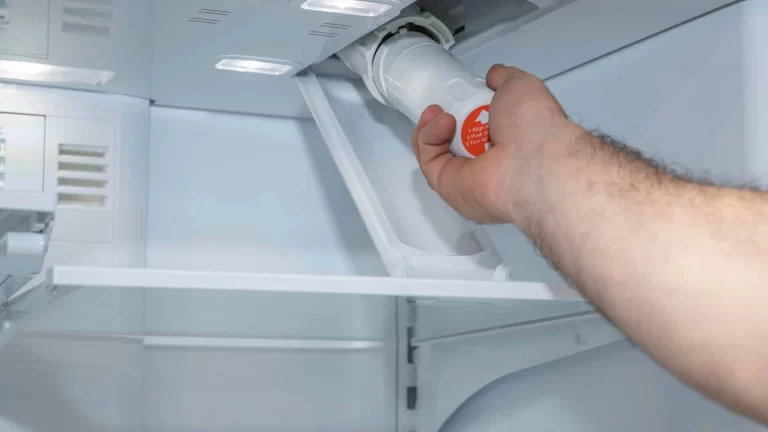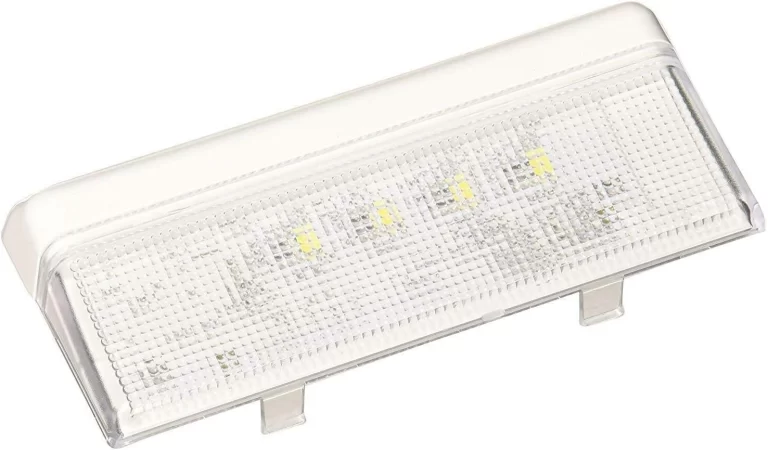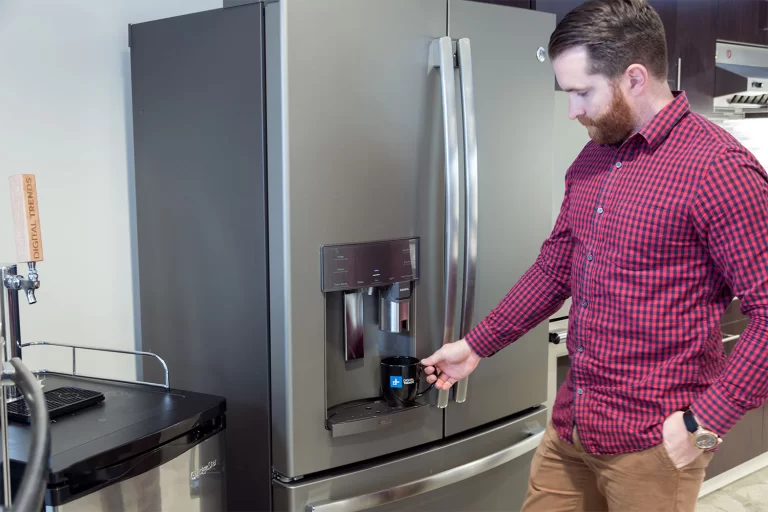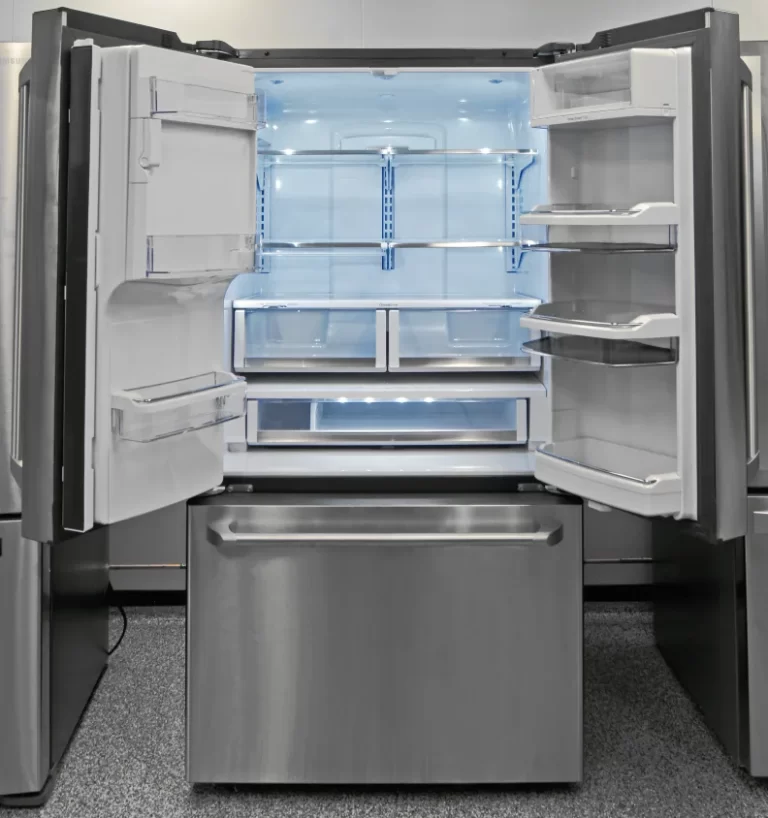Refrigerators are an indispensable part of our lives, especially those made by tech giants like Samsung. Known for their sleek design, durability, and efficient performance, Samsung refrigerators are a popular choice worldwide. However, there’s one phenomenon that seems to puzzle Samsung fridge owners – the mysterious case of the Samsung refrigerator noise that stops when you open the door. It’s essential to understand what this might indicate and how to address it if necessary.
When a Samsung refrigerator noise stops when the door is open, it’s a normal operation. Opening the door triggers the automatic shutdown of the evaporator fan and the compressor, resulting in silence. This energy-saving feature helps reduce noise and save power when the fridge is not in use.
Troubleshooting Guide for Noisy Samsung Refrigerator When the Door Is Open
| Issue | Likely Cause | Recommended Fix | Additional Explanation and Tips |
| The door has been open for too long | Inefficient cooling due to extended open door duration | Try shutting the door firmly. If it doesn’t close properly, inspect the door seal for faults and replace if necessary. | To maintain optimal cooling and prevent excessive noise, avoid keeping the door open for prolonged periods. Check the door seal regularly to ensure proper closure. |
| Squeaky hinge | Hinge friction causing noise | Spray the hinges with food-grade silicone lubricant | Regularly lubricate the hinges to prevent squeaking and ensure smooth operation. |
| Misaligned fridge | Unbalanced or uneven placement causing vibrations | Level up the fridge to reduce vibrations and ensure stability | Use a leveling tool to adjust the fridge’s feet or place shims under the uneven side to achieve proper balance. |
| Leaky door strap | Worn-out or damaged door strap causing noise | Repair or replace the leaky door strap | Inspect the door strap for cracks or wear and replace if necessary to maintain a proper seal. |
| Ice obstruction | Ice buildup obstructing fan or components | Allow the fridge to self-defrost by unplugging it for several hours | Unplugging the fridge allows the accumulated ice to melt, helping restore proper airflow and eliminate noise. |
| Incorrectly placed glass items | Glass items vibrating or rattling due to improper positioning | Correctly position the glass items in the fridge | Ensure glass items are securely placed and arranged to minimize movement and prevent vibrations. |
| Damaged evaporator fan motor | Faulty fan motor causing noise | Contact Samsung for professional repair or replacement | If none of the above fixes address the noise issue, it may indicate a damaged evaporator fan motor that requires professional assistance. |
| Faulty compressor | Malfunctioning compressor resulting in noise | Contact Samsung for professional repair or replacement | If the noise persists and other troubleshooting steps don’t resolve the issue, it could indicate a faulty compressor. Seek professional help for diagnosis and repair. |
Refrigerator Noise Diagnosis: Common Reasons and Causes
Most noises a refrigerator makes are just part of its normal operation. However, certain sounds may indicate an issue. For example, a clicking sound could be the compressor trying to restart, while a buzzing noise might come from the water inlet valve trying to open. Meanwhile, a constant noise that stops when the door is opened is usually related to one of the fans.
Understanding Why Samsung Fridge Noise Stops When the Door Opens

So, why does the noise stop when the door is opened? The answer lies in the fridge’s design. When you open the door, the refrigerator senses a rise in temperature and temporarily halts certain operations to save energy. This includes the evaporator fan motor and the condenser fan motor, which are often the sources of noise in a fridge.
For example, the evaporator fan motor in the freezer spins to circulate cold air throughout the refrigerator. However, if something goes wrong, such as ice buildup or a fault in the fan blades, it can produce noise. When you open the door, the fan automatically stops, cutting off the noise.
Similarly, the condenser fan motor, located at the back of the fridge, can also be a source of noise. It cools the compressor and condenser coils and can get noisy if it malfunctions or gets clogged with debris. Again, when you open the door, this fan also stops, halting the noise.
Samsung Refrigerator Noise Won’t Stop When the Door Opens (Samsung Fridge High Pitched Noise)

When your Samsung refrigerator continues to make noise, specifically a high-pitched noise, even after you’ve opened the door, it signals that there may be an underlying issue that requires your attention. Here, we break down the potential reasons and provide you with practical solutions.
Learn More: Samsung refrigerator not making ice but water works
1. Faulty Evaporator Fan Motor
One of the common reasons behind a high-pitched noise from your Samsung refrigerator is a faulty evaporator fan motor. This fan is responsible for circulating cold air throughout your refrigerator. When it starts malfunctioning, it could start making an unusual high-pitched sound.
Solution: Inspect the fan for any visible damage. If the noise persists or the freezer compartment is warmer than usual, it may be necessary to replace the evaporator fan motor. We recommend getting professional help to ensure correct installation.
2. Ice Buildup Around the Fan
An ice buildup around the fan can cause it to hit against the ice while spinning, resulting in a high-pitched noise. This usually happens if the defrost system of your refrigerator isn’t working correctly, causing an ice buildup around the fan.
Solution: To rectify this, you’ll need to defrost the refrigerator. Unplug the refrigerator and leave the doors open for a few hours. If the issue persists, it may point towards a deeper problem with your defrost system, and professional assistance may be needed.
3. Misaligned Fan Blade
Sometimes, the fan blade can become misaligned, causing it to brush against other components and produce a high-pitched sound.
Solution: Inspect the fan blade to check if it’s misaligned. If it’s indeed the case, realigning or replacing the blade can solve the problem. However, ensure you handle this carefully to avoid causing any further damage.
4. Defective Compressor
The compressor is the heart of your refrigerator’s cooling system. It compresses the refrigerant and pumps it through the evaporator coils. When it’s defective or worn out, it may start making a high-pitched noise.
Solution: If your compressor is faulty, it is often more economical to replace the refrigerator than to repair it, as the compressor is a costly component. However, make sure to consult with a professional before making a decision.
5. Overworking Condenser Fan Motor
The condenser fan motor is located near the compressor at the bottom rear of the refrigerator. It helps in heat dissipation. If it’s overworking due to a fault or dust buildup, it could produce a high-pitched sound.
Solution: Clean the condenser coils and ensure the area around the refrigerator is well-ventilated. If the noise persists, you may need to replace the condenser fan motor.
Unusual Sounds from a Samsung Refrigerator When the Door is Closed

Quick Troubleshooting Guide:
| Fridge Noise | Cause | Fix |
| Beeping/Chiming | Door left open for long or not shut properly in Samsung models | Ensure the fridge door is properly closed. Check the door seal for any damage or wear and replace if necessary. |
| Popping/Crackling/Snapping | Expansion and contraction of plastic parts during defrosting cycle in Samsung models | This noise is normal during the defrost cycle and should fade away on its own. If the noise persists or is accompanied by other issues, contact Samsung for assistance. |
| Whistling/Blowing | Circulating or running fans in Samsung models | Reposition the refrigerator to ensure proper airflow. If the noise continues or becomes disruptive, contact Samsung for further support. |
| Rattling | Loose components or objects rubbing against the fridge’s walls in Samsung models | Inspect the interior and exterior of the refrigerator for any loose or rattling components. Secure any loose parts and remove any objects that are in contact with the walls to eliminate the noise. |
| Bubbling/Hissing/Gurgling | Normal refrigerant flow or water dripping sounds in Samsung models | These noises are part of the normal operation of the refrigerator and are not cause for concern. No action is required unless the sound is unusually loud or persistent. |
| Low Hum/Buzz | Ice maker operation or running compressor in Samsung models | Ensure the ice maker is properly connected to the water supply. If the noise persists or becomes excessively loud, it may indicate a problem with the compressor. Contact Samsung for further assistance. |
| Low Grind | Ice dispensing from the ice maker in Samsung models | Allow the dispenser to complete the ice dispensing cycle. If the grinding noise continues or becomes disruptive, check for any obstructions in the ice chute or contact Samsung for support. |
| Clicking | Ice maker filling up with water in Samsung models | This is a normal sound as the ice maker fills up with water. If the clicking noise persists or is accompanied by other issues, contact Samsung for further assistance. |
| Loud Bang | Ice dropping into the ice bucket or an unstable item in the fridge in Samsung models | Secure any unstable items in the fridge. If the loud banging noise continues, check the ice maker for proper operation or contact Samsung for support. |
| Fluttering | Normal response to the unit reaching a specific temperature in Samsung models | Reset the refrigerator’s temperature settings to ensure proper cooling. If the fluttering noise persists or is accompanied by cooling issues, contact Samsung for further assistance. |
| Rattling (unusual) | Damaged condenser fan motor in Samsung refrigerators | If you hear a rattling noise coming from the back of the refrigerator, it may indicate a damaged condenser fan motor. Contact Samsung support for professional repair or replacement. |
| Loud humming (unusual) | Possible compressor failure or ice blockage in Samsung’s frost-free models | If you hear a loud humming noise that persists or is accompanied by cooling issues, it may indicate a compressor failure or ice blockage. Contact Samsung for professional assistance and avoid attempting repairs yourself. |
1. Ice Build-up (Grinding Sound)
An abnormal grinding sound in your Samsung refrigerator when the door is closed often indicates an ice build-up. Specifically, the evaporator fan, which circulates cold air throughout the fridge, might be hitting against the accumulated ice, causing a grinding or buzzing noise.
Fix: To address this issue, a comprehensive defrosting process is necessary. Begin by unplugging the refrigerator, and remove all perishable food items. Then, let the refrigerator stand unplugged for at least 24 hours. This allows all accumulated ice to melt away, potentially eliminating the source of the grinding sound. Once the defrosting period has passed, plug the refrigerator back in and observe if the noise persists. If it does, it would be wise to call a professional technician to inspect the appliance, as the problem could lie deeper within the refrigeration system.
2. Faulty Evaporator Fan Motor (Humming or Buzzing)
A malfunctioning evaporator fan motor can result in a humming or buzzing noise. This motor, located in the freezer section, is responsible for circulating cold air around the unit. If the motor starts to fail, it may struggle to operate properly, leading to louder than normal humming or buzzing sounds. Additionally, a faulty evaporator fan motor could result in inefficient cooling within the freezer.
Fix: If you suspect the evaporator fan motor is the cause of the noise, an inspection is required. Depending on your comfort level with appliance repair, you may want to handle this yourself or call in a professional. If you’re doing a DIY inspection, ensure the refrigerator is unplugged before you start. Open the freezer compartment and locate the evaporator fan – it’s typically behind a panel. Check the fan for any visible signs of damage or obstructions. If the fan appears damaged or continues to make noise once power is restored, a replacement may be necessary. When in doubt, or if the issue persists, consider seeking help from a professional technician.
3. Bad Compressor (Loud Humming or Buzzing)
The compressor of your Samsung refrigerator is another integral part that could be the source of the noise when the door is closed. This component is the heart of your fridge’s cooling system, and when it begins to fail, it often produces a loud humming or buzzing noise. Additionally, if your fridge isn’t cooling properly, a faulty compressor could be the culprit.
Fix: Unfortunately, fixing a bad compressor isn’t a simple DIY task due to the complex and potentially dangerous nature of the job. It involves handling refrigerant, which should only be done by a certified professional to prevent harm to yourself or the environment. If you suspect your compressor is faulty, contact a licensed technician to diagnose and possibly replace the compressor. Be prepared for potentially high costs, as a compressor replacement can be one of the more expensive refrigerator repairs.
4. Faulty Water Inlet Valve (Loud Grinding)
The water inlet valve controls the water flow to the refrigerator’s ice maker and water dispenser. Over time, this valve can become clogged or malfunction, causing the dispenser to struggle to receive water. This can result in a loud grinding noise when the water inlet valve is in operation.
Fix: The water inlet valve is typically located at the back of the refrigerator. If you feel comfortable doing so, you can try cleaning the valve to remove any mineral deposits that may be causing the problem. Make sure the refrigerator is unplugged before you start this process. If cleaning doesn’t help or if you’re not comfortable attempting this repair yourself, you’ll need to call a technician. In many cases, a faulty water inlet valve will need to be replaced.
Abnormal Samsung Refrigerator Noise When the Door is Closed
1. Obstructed Evaporator Fan (Loud Buzzing or Grinding)
If your Samsung refrigerator is making a loud buzzing or grinding noise, it could be due to an obstructed evaporator fan. This fan is responsible for circulating cold air within your refrigerator and if it’s blocked by ice buildup or other obstructions, it can create significant noise as it struggles to spin.
Fix: The first thing you should do is inspect the evaporator fan for visible obstructions. If ice buildup is the problem, you’ll need to defrost your refrigerator. Start by emptying your refrigerator and unplugging it, then leave the door open to allow the ice to melt. This process could take a few hours, so plan accordingly. If the noise persists after defrosting, it may be best to call in a professional to examine the fan and the surrounding parts.
2. Excessive Ice Buildup (Grinding Sound)
An overly frosty freezer can also result in excessive noise. If your freezer is accumulating a lot of ice, it can mean something is wrong with the defrost system of your refrigerator, which can cause a grinding noise.
Fix: Similar to the above solution, the immediate fix is to defrost your freezer. Unplug your fridge and leave the door open for a few hours to allow the ice to melt. To prevent future ice buildup, make sure the freezer door is properly sealed when closed, and avoid leaving it open for extended periods of time. If the issue persists, it might be indicative of a more significant issue with the defrost system. In this case, it’s best to contact a professional.
3. Malfunctioning Evaporator Fan Motor (Loud Humming)
The evaporator fan motor circulates cold air around the fridge. If it starts malfunctioning, it may create a loud humming noise, and the freezer might become warmer than usual.
Fix: If your refrigerator is making a loud humming sound and your freezer is warmer than it should be, you should inspect the evaporator fan. This is a complex task that should ideally be handled by a professional. If the fan motor is found to be faulty, it will need to be replaced.
4. Defective Compressor (Loud Humming or Buzzing)
As mentioned earlier, a defective compressor can produce a loud humming or buzzing noise, but in this case, it is associated with a lack of cooling in the refrigerator.
Fix: If your Samsung refrigerator is making a loud humming noise and not cooling effectively, it is a strong indication that the compressor might need replacement. This is a significant repair that should only be done by a certified technician.
5. Damaged Condenser Fan (Rattling Noise)
The condenser fan, located at the back of the refrigerator, helps dissipate heat and keep the compressor cool. If it gets damaged or obstructed, it can create a rattling noise when the refrigerator door is closed.
Fix: To inspect the condenser fan, first unplug your refrigerator for safety reasons. The fan is typically located at the back of the refrigerator near the bottom, in an enclosed area where the compressor is also found. Look for any obstructions, such as debris or a buildup of ice that might interfere with the fan blades. If the fan blades are damaged or if they do not spin freely, the fan motor might need replacement. Depending on your confidence and skill with appliance repair, this might be a job for a professional technician.
6. Faulty Start Relay (Clicking Noise)
The start relay boosts the compressor, and if it’s defective, you may hear a clicking noise when the door is closed.
Fix: Test the relay for continuity using a multimeter. If it’s defective, replace it to stop the clicking noise.
7. Dislodged Drain Pan (Sloshing Noise)
The drain pan collects water during the defrost cycle. If it becomes dislodged, it can create a sloshing noise.
Fix: Check the placement of the drain pan under your refrigerator. If it’s misaligned or loose, reposition it securely to eliminate the noise.
Check Out: Samsung refrigerator ice maker reset
Possible Concerns and their Solutions: From DIY Fixes to Professional Help
Should you be worried if your Samsung refrigerator makes noise that stops when the door is opened? Not necessarily. As mentioned earlier, this is often a normal part of a fridge’s operation. However, if the noise is excessively loud, continuous, or accompanied by other issues like temperature fluctuations, it’s a good idea to investigate further.
For DIY fixes, you can start by checking the evaporator fan for ice buildup. If you find any, defrosting your refrigerator might solve the problem. Cleaning the condenser fan and coils can also help. If these steps don’t solve the issue, it may be time to call a professional. Remember, Samsung offers a comprehensive warranty and an excellent customer service team ready to assist you with your concerns.
Refrigerator Care Tips: Prevention Measures and Regular Maintenance
Preventing noise issues and extending the lifespan of your Samsung refrigerator largely comes down to regular maintenance. This includes cleaning the coils every six months, checking the door seals, and ensuring the fridge is level. Regularly defrosting your freezer and keeping the refrigerator at the recommended temperature can also prevent issues.
FAQs
What Kind of Noise Is Normal for a Samsung Refrigerator?
Samsung refrigerators are designed to run quietly, but some noises are a normal part of operation. These may include a soft hum from the compressor or fans, occasional pops or cracks as the appliance’s materials expand and contract, or the sound of water dripping into the drain pan.
Why Does My Samsung Refrigerator Make Noise After I Close the Door?
A Samsung refrigerator might make noise after you close the door due to the compressor or fan motors kicking in to cool the refrigerator back to the set temperature, or due to the ice maker starting a new ice-making cycle. However, loud or unusual sounds could be a sign of a problem that needs to be addressed.
What Does It Mean if My Samsung Refrigerator Is Making a High-Pitched Noise?
A high-pitched noise from a Samsung refrigerator could be caused by the fans or compressor working harder due to a blocked air vent, a dirty condenser coil, or a temperature setting that’s too low. It could also be a sign of a failing evaporator fan or compressor.
What Should I Do if My Samsung Refrigerator Is Making a Rattling Noise?
A rattling noise can be a sign that something inside the refrigerator is loose, such as a drain pan or screws, or that the condenser fan is malfunctioning. If you can’t find a simple cause like an unsecured drain pan, you should contact a professional to avoid causing further damage.
Why Does My Samsung Refrigerator Make More Noise in Hot Weather?
A Samsung refrigerator might make more noise in hot weather because the compressor and fans have to work harder to keep the appliance cool. You can help reduce the load on the refrigerator by ensuring it’s not placed in direct sunlight and that there’s plenty of ventilation around it.
Conclusion
While a Samsung refrigerator noise that stops when you open the door can seem puzzling, it’s often just a normal part of the fridge’s operation. However, understanding why it happens can give you peace of mind and help you troubleshoot if the noise becomes a problem. Regular maintenance can prevent many common fridge issues, and remember, if you need help, Samsung’s customer service is just a call away.






